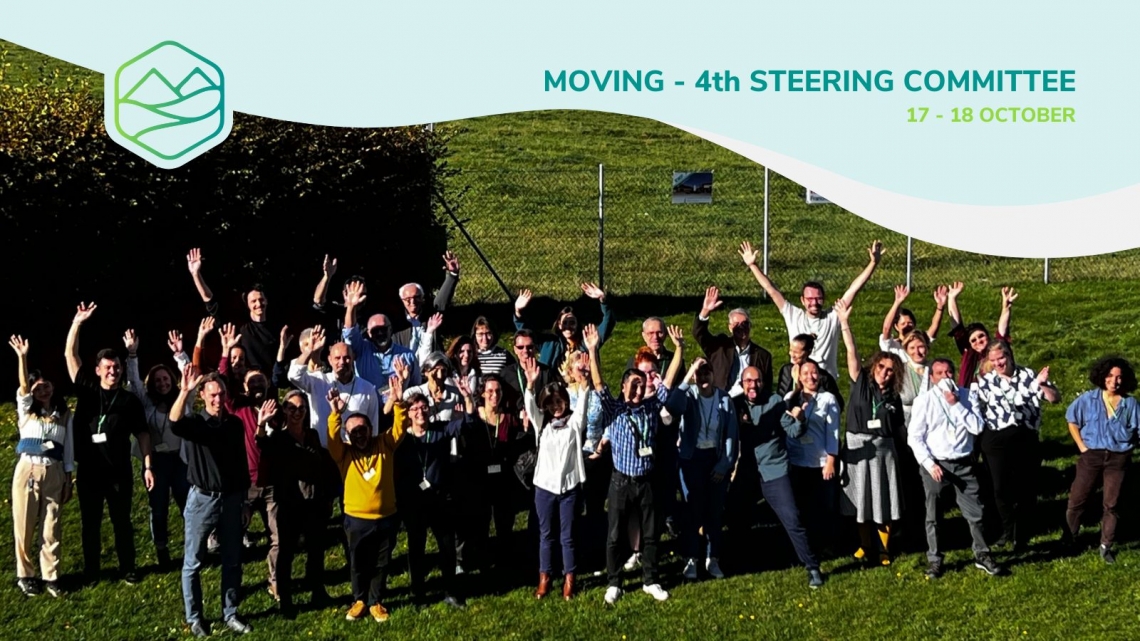News
CNVP attends the Steering Committee meeting of MOVING in Switzerland

MOVING (MOuntain Valorisation through INterconnectedness and Green growth) partners met on 17 and 18 October in Saignelégier, Switzerland for the Steering Committee meeting to assess the progress achieved during the first two years of the project and discuss the next steps.
CNVP North Macedonia is implementing the MOVING project with a consortium of 23 partner organizations (research centers and institutes, industry representatives, rural developers, and innovation agents) to co-design the policy framework that allows the development of value chains guaranteeing the sustainability & resilience of mountain areas. Within the project framework, activities in North Macedonia are focused on the Maleshevija region.
The coordinator of MOVING, Mar Delgado from the University of Córdoba, emphasized the progress that was achieved in last two years, highlighting the research that was carried out so far and scientific evidence which is being disseminated in various events and publications.
On the first day, each of the project partners reviewed the work done so far on the Conceptual and Analytical Framework that is built upon participatory theory. A workshop was also organized on meaningful engagement in regional Multi Actor Platforms (MAPs). The vulnerability and resilience performance of the 23 MOVING Reference Region Value Chains (task 4.5 within WP4) was also reflected upon. The first day concluded with a session on MOVING value chains and another one on MOVING regions.
In the second day, participants gathered together to brainstorm on youth engagement activities and shared some ideas in order to collectively write additional scientific publications to further disseminate the body of evidence provided by MOVING so far. There was a dedicated discussion regarding policy analysis and foresight (WP5), which will have a busy activity over the last year of MOVING. There was a rich discussion on the guidance of the existing policies of relevance to mountain value chains and how to properly factor the administrative cultures and other pre-existing factors that either drive or affect structural change and which exist at and local, regional, national, EU levels.
The event included a session with MOVING Advisory Board members Guillaume Corradino (Euromontana) and Riccardo Crescenzi (London School of Economics). Both shared insights on the challenges of resilience and sustainability that mountain areas face and on the global opportunities for innovation development in rural areas, respectively. Guillaume outlined the many additional opportunities that MOVING and Euromontana can collaborate in the future. Riccardo presented a significant body of evidence about the importance of Geographical Indication and Foreign Direct Investment strategies and agencies in driving mountain value chains’ internalisation in EU and global markets. The Next Generation EU funds together with CAP and Cohesion policy can act as drivers for such changes.
The Steering Committee, concluded that so far good progress has been made in the development of land use systems and land cover maps in the 23 mountain RRs; a participatory vulnerability analysis of value chains has also been produced as well as the first set of 23 Policy Briefs and Practice Abstracts; workshops were organized with local stakeholders; the MOVING App has also been developed, having the pilot version almost ready; the European Multi-Actor Platform (EU MAP) has also grown, currently with 54 members; after its first webinar on Mountain Value Chains: heterogeneity and innovation, the MOVING EU MAP is going to organise a second one, in this case focusing in European Quality schemes and the added value for mountain value chains; the European platform also contributed to two EU public consultations: Brain drain and Sustainable food systems.
The next steps agreed by the Steering Committee include:
- Finalise the MOVING app by the end of the year and carry out the youth engagement workshops (WP1).
- Include new concepts and approaches in the Conceptual and Analytical Framework in order to progress on the process of participatory theory building (WP2).
- Produce and provide interactive visual tools that deliver actual information on assets, sustainability, and resilience of mountain value chains (WP3).
- All partners will analyze the vulnerability of each value chain mapped and develop the digital stories (WP4).
- Progress on the work packages: WP5 Cross-case comparison and benchmarking; WP6 Participatory multi-level foresight and WP7 Policy analysis and roadmap.
- The MOVING Community of Practice will continue to carry out various stakeholder engagement activities, and thematic actions such as organising the second EU MAP webinar on European Quality schemes – the added value for mountain value chains, which will take place on the 8th of November.
